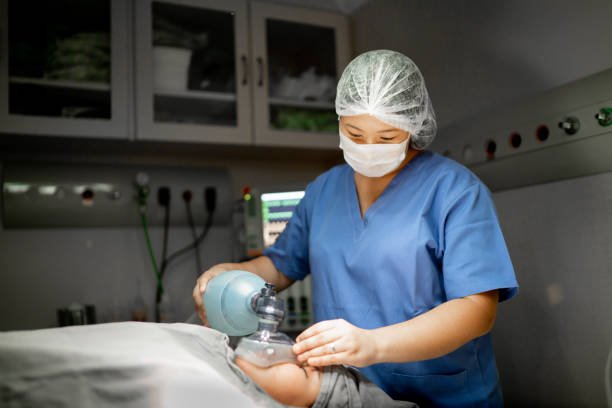A registered nurse can advance to become a nurse anesthetist. These nurses are in charge of the anesthesia patients receive before, during, and after surgery. Nurse anesthetists’ salaries are higher than those of other workers in a hospital because of their high level of specialization and dedication to patient safety during surgical operations. CRNA, or certified registered nurse anesthetist, is another name for this nurse. Additionally, anesthetist nurses tend to those who have recently undergone anesthesia or are in the process of recuperating from it. These nurses can work independently with a team of other hospital staff members since they have specialized training in anesthesia.
In short, anesthesia is nothing more than a medical method used to make you feel unconscious during a procedure or surgery. As professionals in the administration of anesthesia and its aftereffects, CRNAs handle intricate jobs requiring a high level of expertise. And as a result, nurse anesthetists’ salaries are good. We will go into further detail about the anesthetic wage, career outlook, and necessary abilities in this blog.
Nurse anesthetist salary & job outlook
Nurse anesthesia, or CRNA, is one of the many jobs in healthcare that requires a lot of skill, which is why their pay is excellent. This falls between ₹50k and ₹75k. Because of their vital role in providing anesthesia care, especially in underserved and rural areas where there may be a shortage of anesthesiologists, nurse anesthetists are currently in high demand. Their increased training makes it possible for them to independently administer anesthesia, which improves the accessibility and efficiency of surgical procedures. And for that reason, nurse anesthesia requirements exist everywhere in the world.
Skills of a Nurse anesthetist
Here are some essential skills that a nurse anesthetist must possess when their skill set is different from that of other workers in a hospital.
Fast
The nurse needs to be prompt and effective. Not just in the action but in the decision-making as well. They should execute the process quickly and precisely, especially in high-stress situations like operating rooms. You never know when an emergency or unexpected circumstance may arise, and they must act quickly to ensure patient safety.
Being Careful
This is a crucial ability that an anesthetist nurse needs to possess. The nurse must give the right amount of anesthesia, closely check the patient’s vital signs, continue treatment as needed, and take appropriate breaks from the patient while doing so. Here, due diligence has minimized and avoided difficulties while simultaneously ensuring the patient’s stability and comfort throughout the process.
Manual Dexterity
You have to study and have strong coordination because you have to administer anesthesia and perform a crucial task. As an anesthetic nurse, you have to insert the intravenous line needle precisely and handle sensitive devices with accuracy. The maintenance of the general standard of care and the efficient and safe administration of anesthesia is ensured by the high degree of accuracy with which these procedures can be carried out.
Emotional Resilience
In addition to caring for the patient, an anesthetist nurse has other duties. Additionally, you must try to comprehend emergencies where maintaining composure under duress is crucial.
These were some of the most important competencies for a nurse anesthetist. Not quite like this, but in the healthcare industry all hospital staff ought to possess these kinds of abilities to ensure the institution runs smoothly.
How to become a nurse anesthetist

Anesthetist nurse course: a certified registered nasal anesthesiologist (CRNA) requires working in a surgical room, which can be challenging. Years of experience are required. To become a registered nurse, you must first complete your 12th in science, after which you must pursue an ADN and BSN. Following the completion of this degree, you must pass the NCLEX-RN exam. Once you have done so, obtain some experience and complete some foundational coursework. After that, just keep practicing because it will sharpen your ability.
As you gain experience by doing extra training, you will be in a better position to become a nurse anesthetist. The more work you do, the more tasks you will accomplish, the more experience you will gain, and the higher compensation you will receive.
Anesthetist nurse courses also include gaining experience working in an intensive care unit (ICU) after becoming a registered nurse. This will enable you to obtain more experience. Completing a nursing anesthesia school and receiving good training or other certified courses in nurse anesthesia will also enable you to ensure that your employment has good wages.
Conclusion
A successful and difficult career path with significant earning potential and reliable job stability is becoming a Certified Registered Nurse Anesthetist. CRNAs are essential to modern medicine and they have a bright future ahead of them due to the growing need for anesthetic treatments. A special blend of clinical expertise, analytical reasoning, and mental strength are required for the position. A career as a certified registered nurse (CRNA) can be financially and professionally beneficial for individuals who are willing to put in the thorough education and training needed. There are various sites for hospital staff to log in to look for nurse anesthetist requirements after completing the Anaesthetist Nurse course.

